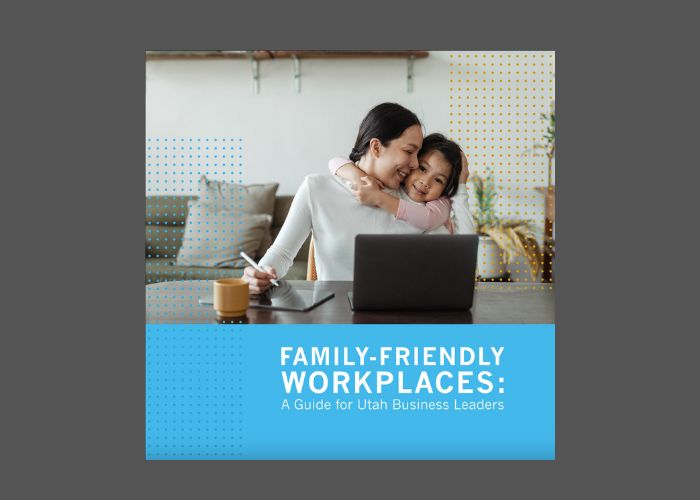New guide outline steps for Utah business leaders to create family-friendly workplace policies
SALT LAKE CITY, UTAH (May 4, 2023) – Utah Community Builders, in partnership with the Salt Lake Chamber, United Way of Salt Lake, and Voices for Utah Children, debuted a new resource for the business community entitled Family-Friendly Workplaces: A Guide for Utah Business Leaders. The guide spotlights valuable data, what to consider, and actionable steps with best practices for businesses to elevate the culture and leadership around child care support.
“We believe the private sector can positively impact Utah’s workforce by addressing the intersectionality of child care, employee wellness, employee retention and upward mobility,” said Derek Miller, president and CEO of the Salt Lake Chamber. “Utah’s working parents need business leaders who are willing to elevate corporate culture by taking a comprehensive approach to the child care challenge. We hope this guide will be a helpful resource for Utah leaders in business, government and community.”
Businesses can start to address the issue by:
- Understanding the needs of working parents: They are a business’s most valuable resource for finding solutions that directly benefit employees and the business. This can be done by seeing what data is already available, conducting employee surveys and focus groups, and simply opening up lines of communication between staff and management.
- Recognizing they are not alone in this issue: There are existing resources and community partners available to provide businesses with expertise and information to help guide them on child care options.
- Taking small steps to get quick wins: Generate momentum and enthusiasm for meeting the child care challenge. Some ideas include establishing flexibility and predictability with schedules when possible and providing employees with a directory of local child care programs in the community.
- Cultivating strong leadership and elevated culture: By having high-level personnel involved in the effort to promote child care benefits and options in a business, they are better able to foster new ideas. Meaningful and positive change will be most successful when it is supported from the top.
“Lack of affordable child care is a massive barrier to parents’ ability to work and ultimately impacts Utah businesses and our economy,” said Bill Crim, president and CEO of United Way of Salt Lake. “As a community, we have to come together to help families with the resources that will enable them to work, and to advance their careers.”
Child care is one of the biggest costs challenging families and as the child care crisis drags on, accessibility and affordability are increasingly out of reach. Not only that, federal pandemic relief funds are drying up, leaving many Utahns and families across the country to face a reality that child care needs may not be met.
“When the wellbeing of young children is at the center of public policy and community investment, our entire state does better,” said Moe Hickey, executive director of Voices for Utah Children. “It is possible to build an early childhood system in Utah that supports families by making sure they have access to affordable and appropriate options for their children’s early care and learning — whether children spend their days at home, in formal child care, at public school, or in the care of trusted family and friends. But Utah hasn’t taken the necessary steps to do so. We need to come together as leaders to do whatever is necessary to improve the status of child care in our state.”
Families are not the only ones affected. Child care providers and business owners also feel a burden to maintain access to child care due to greater difficulty in finding staff, preventing employee turnover, and paying workers enough to enable them to meet all the financial demands facing their families. A future with more care center closures, growing child care deserts, and fewer options for families means higher economic costs for communities across Utah.
“As CEOs, we must embrace the fact that our employees have families and responsibilities outside of work,” said Cyd Tetro, CEO of Brandless and president of Women’s Tech Council. “Therefore, to create a culture and environment that allows employees to thrive, businesses must be an active partner in finding child care and workforce solutions. The first and foremost effort would be to change the way leadership thinks about our workplaces and to provide more workplace flexibility, allowing employees to better manage all aspects of their lives.”
Ultimately, it is up to businesses to think creatively about ways to build the child care infrastructure we need to help working parents keep working for their families, and the economy as a whole. To accomplish this, the guide helps businesses understand the needs of working partners, the child care landscape in their communities and available resources to create a strong and supported workplace culture.
“As a working parent myself, I personally know the importance of finding reliable, safe care for your children while you’re away,” said Heather Brace, chief people officer of Intermountain Health. “That’s why Intermountain Health has six onsite child development centers, from Logan to St. George, to support our employees. We currently care for 736 children enrolled in our centers, which supports 551 employees, and are always looking for other high-quality care options to expand the benefit to more employees. It’s time for Utah business leaders to come together to think of ways to support more employees with child care and access.”
This guide can be a resource for Utah leaders in business, government, and community. CEOs, presidents, managers, and human resource professionals throughout Utah’s business community are encouraged to carefully review the contents of the guide, and consider what steps they can take in their organizations to support the child care needs and overall well-being and success of their employees.
To view the Family-Friendly Workplaces: A Guide for Utah Business Leaders, click here.
###
ABOUT THE UTAH COMMUNITY BUILDERS
Utah Community Builders, is the 501(c)(3) nonprofit social impact foundation of the Salt Lake Chamber. Utah Community Builders creates a platform for businesses to engage our most pressing challenges, harnessing the innovation and efficiency of the private sector to drive real progress on social issues affecting our businesses, workforce, families, and all Utahns. The Utah Community Builders Advisory Board is co-chaired by Clark Ivory, CEO of Ivory Homes, and Lisa Eccles, president and COO of the George S. and Dolores Doré Eccles Foundation.
ABOUT THE SALT LAKE CHAMBER
The Salt Lake Chamber is Utah’s largest and longest-standing business association. A statewide chamber of commerce with members in all 29 Utah counties, the Chamber represents the broad interests of the state’s 63,000- plus employers, which employ more than 1.4 million Utahns. This includes thousands of Chamber members and their employees. With roots that date back to 1887, the Chamber stands as the voice of business, supports its members’ success and champions community prosperity.
ABOUT UNITED WAY OF SALT LAKE
Established in 1904 as the Salt Lake Charity Association, its original mission was to help the poor, discourage panhandling, and coordinate various programs. The historic “community chest” with a broad charitable mission has transformed into an agent for social change. Today, United Way of Salt Lake is pursuing lasting social change on some of the toughest challenges we face, including poverty, poor health and lagging educational achievement. Learn more at www.uw.org.
ABOUT VOICES FOR UTAH CHILDREN
Voices for Utah Children is a non-profit, non-partisan statewide organization committed to advocating for, and advancing, policies and practices that are good for all of Utah’s children. Voices for Utah Children conducts research, produces reports and analysis, raises awareness of children’s issues, and influences policies that impact children. For more information about Voices, visit www.utahchildren.org.


